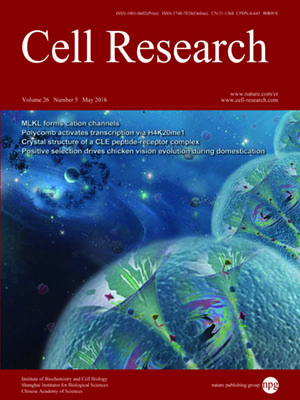
Volume 26, No 5, May 2016
ISSN: 1001-0602
EISSN: 1748-7838 2018
impact factor 17.848*
(Clarivate Analytics, 2019)
Volume 26 Issue 5, May 2016: 529-542 | Open Access
ORIGINAL ARTICLES
A positive role for polycomb in transcriptional regulation via H4K20me1
Xiangdong Lv1, Zhijun Han2, Hao Chen1, Bo Yang1, Xiaofeng Yang1, Yuanxin Xia1, Chenyu Pan1, Lin Fu1, Shuo Zhang1, Hui Han1, Min Wu3, Zhaocai Zhou1, Lei Zhang1,5, Lin Li4,5, Gang Wei2 and Yun Zhao1,5
1State Key Laboratory of Cell Biology, CAS Center for Excellence in Molecular Cell Science, Innovation Center for Cell Signaling Network, Institute of Biochemistry and Cell Biology, Shanghai Institutes for Biological Sciences, Chinese Academy of Sciences, Shanghai 200031, China
2Key Laboratory of Computational Biology, CAS-MPG Partner Institute for Computational Biology, Shanghai Institutes for Biological Sciences, Chinese Academy of Sciences, Shanghai 200031, China
3Department of Biochemistry and Molecular Biology, College of Life Sciences and Key Laboratory of Intestinal and Colorectal Diseases, Wuhan University, Wuhan, Hubei 430072, China
4State Key Laboratory of Molecular Biology, CAS Center for Excellence in Molecular Cell Science, Innovation Center for Cell Signaling Network, Institute of Biochemistry and Cell Biology, Shanghai Institutes for Biological Sciences, Chinese Academy of Sciences, Shanghai 200031, China
5School of Life Science and Technology, Shanghai Tech University, Shanghai 200031, China
Correspondence: Yun Zhao, E-mail: yunzhao@sibcb.ac.cn; Gang Wei,(weigang@picb.ac.cn)
The highly conserved polycomb group (PcG) proteins maintain heritable transcription repression of the genes essential for development from fly to mammals. However, sporadic reports imply a potential role of PcGs in positive regulation of gene transcription, although systematic investigation of such function and the underlying mechanism has rarely been reported. Here, we report a Pc-mediated, H3K27me3-dependent positive transcriptional regulation of Senseless (Sens), a key transcription factor required for development. Mechanistic studies show that Pc regulates Sens expression by targeting H4K20me1 at the Sens locus. Further bioinformatic analysis at genome-wide level indicates that the existence of H4K20me1 acts as a selective mark for positive transcriptional regulation by Pc/H3K27me3. Both the intensities and specific patterns of Pc and H3K27me3 are important for the fates of target gene transcription. Moreover, binding of transcription factor Broad (Br), which physically interacts with Pc and positively regulates the transcription of Sens, is observed in Pc
+ H3K27me3
+ H4K20me1
+ genes, but not in Pc
+ H3K27me3
+ H4K20me1
− genes. Taken together, our study reveals that, coupling the transcription factor Br, Pc positively regulates transcription of Pc
+ H3K27me3
+ H4K20me1
+ genes in developing Drosophila wing disc.
10.1038/cr.2016.33
FULL TEXT | PDF
Browse 2503


